
CAS Newsletter 2015/2016
Articles, pictures and interviews can be reprinted only with the consent of Centre for Advanced Study Sofia (CAS - Sofia). Any citations should be duly acknowledged.
More...We kindly inform you that, as long as the subject affiliation of our 300.000+ articles is in progress, you might get unsufficient or no results on your third level or second level search. In this case, please broaden your search criteria.

Articles, pictures and interviews can be reprinted only with the consent of Centre for Advanced Study Sofia (CAS - Sofia). Any citations should be duly acknowledged.
More...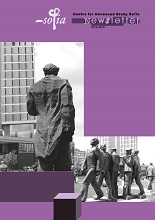
Articles, pictures and interviews can be reprinted only with the consent of Centre for Advanced Study Sofia (CAS - Sofia). Any citations should be duly acknowledged.
More...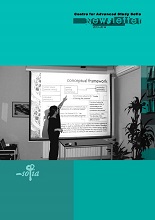
Articles, pictures and interviews can be reprinted only with the consent of Centre for Advanced Study Sofia (CAS - Sofia). Any citations should be duly acknowledged.
More...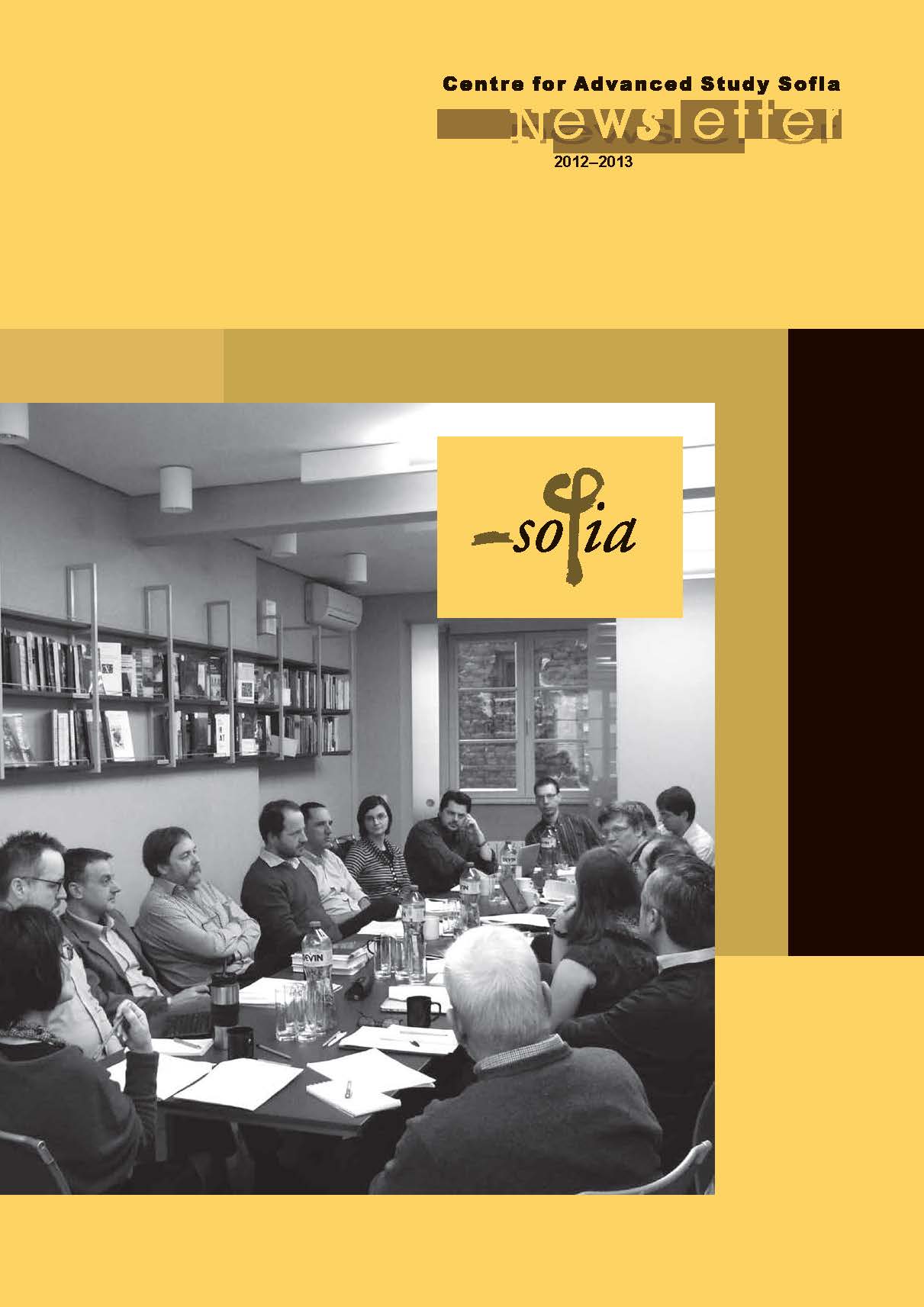
Articles, pictures and interviews can be reprinted only with the consent of Centre for Advanced Study Sofia (CAS - Sofia). Any citations should be duly acknowledged.
More...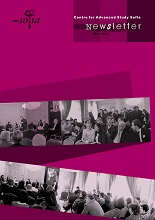
Articles, pictures and interviews can be reprinted only with the consent of Centre for Advanced Study Sofia (CAS - Sofia). Any citations should be duly acknowledged.
More...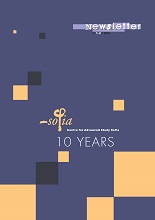
Articles, pictures and interviews can be reprinted only with the consent of Centre for Advanced Study Sofia (CAS - Sofia). Any citations should be duly acknowledged.
More...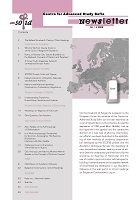
Articles, pictures and interviews can be reprinted only with the consent of Centre for Advanced Study Sofia (CAS - Sofia). Any citations should be duly acknowledged.
More...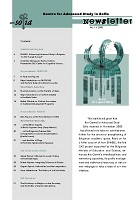
Articles, pictures and interviews can be reprinted only with the consent of Centre for Advanced Study Sofia (CAS - Sofia). Any citations should be duly acknowledged.
More...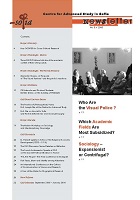
Articles, pictures and interviews can be reprinted only with the consent of Centre for Advanced Study Sofia (CAS - Sofia). Any citations should be duly acknowledged.
More...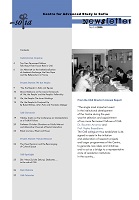
Articles, pictures and interviews can be reprinted only with the consent of Centre for Advanced Study Sofia (CAS - Sofia). Any citations should be duly acknowledged.
More...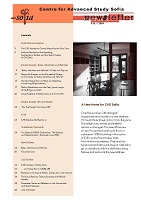
Articles, pictures and interviews can be reprinted only with the consent of Centre for Advanced Study Sofia (CAS - Sofia). Any citations should be duly acknowledged.
More...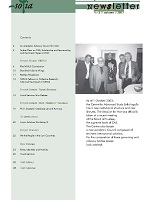
Articles, pictures and interviews can be reprinted only with the consent of Centre for Advanced Study Sofia (CAS - Sofia). Any citations should be duly acknowledged.
More...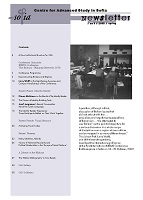
Articles, pictures and interviews can be reprinted only with the consent of Centre for Advanced Study Sofia (CAS - Sofia). Any citations should be duly acknowledged.
More...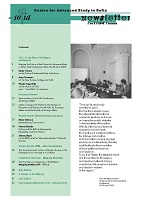
Articles, pictures and interviews can be reprinted only with the consent of Centre for Advanced Study Sofia (CAS - Sofia). Any citations should be duly acknowledged.
More...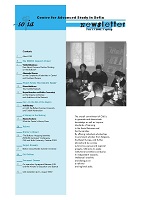
Articles, pictures and interviews can be reprinted only with the consent of Centre for Advanced Study Sofia (CAS - Sofia). Any citations should be duly acknowledged.
More...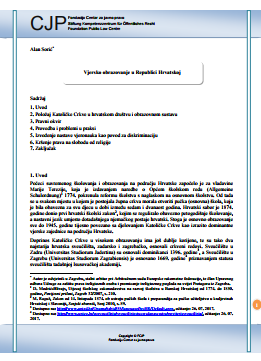
This paper investigates issues relating to religious education in public school system in the Republic of Croatia. It focuses mainly on Catholic Catechism in public school, due to the fact that population of Croatia is predominantly Catholic and the fact that Croatia has entered into international accords with Holy See. Paper particularly analyzes and describes instances of discrimination of nonreligious school children and criticizes the fact that no alternative education is provided to such children, at least in the first three grades of elementary schools. Finally, the paper offers certain recommendations to mitigate existing problems and to eliminate discrimination from public school system of the Republic of Croatia.
More...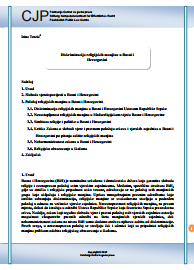
Isprepletenost i podudarnost etničke i religijske pripadnosti u BiH direktno se odražava na položaj religijskih manjina u BiH. Zbog takve karakteristične strukture, gdje se svi napori usmjeravaju ka pružanju jednakog tretmana trima većinskim religijama, prava religijskih manjina ostaju zapostavljena. Iako su na snazi mnogi pravni propisi koji garantiraju jednak položaj svih religijskih zajednica, religijske manjine se svakodnevno stavljaju u obespravljen položaj. To je na primjer vidljivo iz činjenica da Ustav Republike Srpske navodi Srpsku pravoslavnu crkvu kao crkvu srpskog naroda i drugih naroda pravoslavne vjere, te da religijske manjine nisu zastupljene u Međureligijskom vijeću BiH. Pored toga, obespravljenost religijskih manjina dolazi do izražaja i u koncepciji religijskog obrazovanja u školama, gdje u većini slučajeva učenici nisu u mogućnosti da pohađaju religijsko obrazovanje po svom izboru, nego zbog konretnih okolnosti moraju konzumirati vjersku pouku većinske religije. Problemi sa legislativom u BiH, kao što su neharmoniziranost te siromašna zakonska zaštita od diskriminacije, samo dodatno doprinose marginalizaciji religijskih manjina u društvu. Zbog pojedinih Ustavnih odredbi koje omogućuju povlašteni položaj određenoj religiji i uske povezanosti religije i politike, BiH sve više postaje polusekularna država, u kojoj se za vođstvo takmiče tri većinske religije. Iz svega navedenog slijedi da bi vlasti BiH trebale poduzeti različite mjere kako bi se religijske manjine zaštitile od diskriminacije. Prvi korak bi predstavljalo ukidanje odredbe Ustava Republike Srpske, kojom se daje povlašteni položaj Srpskoj pravoslavnoj crkvi. Dalje, religijske manjine treba da budu zastupljene u organima Međureligijskog vijeća u BiH. Aktivnim djelovanjem Međureligijskog vijeća bi se mogao znatno poboljšati položaj religijskih manjina u društvu. Pored toga, vlasti BiH bi trebale poduzeti korake kako bi harmonizirale i ojačale zakone vezane za zaštitu od krivičnog djela poticanja na mržnju. Iako krivična djela počinjena iz mržnje prema religijskim manjinama nisu česta pojava u BiH, ipak stručnjaci za ljudska prava ukazuju na njihovo postojanje. Stoga bi harmonizacija zakonodavstva znatno olakšala sudijama i tužiocima sankcioniranje krivičnog djela poticanje na mržnju, što bi opt doprinijelo ujednačavanju sudske prakse, a time i efektivnijoj zaštiti i prevenciji od sličnih krivičnih djela. Na posljetku, jedna od ključnih stvari za uklanjanje diskriminacije religijskih manjina u BiH jeste izmjena dosadašnjeg načina religijskog obrazovanja u školama. Umjesto vjerske pouke o samo jednoj religiji, učenici treba da se educiraju o različitim kulturama i religijama. Kao što je predhodno navedeno, zbog okolnosti, škole su ograničene u pogledu pružanja vrste religijskog obrazovanja, tako da bi ovakva opcija bila prikladna za učenike svih vjeroispovijesti, kod kojih bi se ujedno i razvijala svijest o važnosti tolerancije i ravnopravnosti u društvu.
More...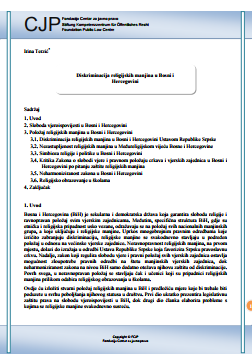
Isprepletenost etničke i religijske pripadnosti u BiH se direktno odražava na položaj religijskih manjina u BiH. Zbog takve karakteristične strukture, gdje se svi napori usmjeravaju ka pružanju jednakog tretmana trima većinskim religijama, prava religijskih manjina ostaju zapostavljena. Iako su na snazi mnogi pravni propisi koji garantiraju jednak položaj svih religijskih zajednica, religijske manjine se svakodnevno stavljaju u obespravljen položaj. Na primjer, to je vidljivo iz činjenica da Ustav Republike Srpske navodi Srpsku pravoslavnu crkvu kao crkvu srpskog naroda i drugih naroda pravoslavne vjere, te da religijske manjine nisu zastupljene u Međureligijskom vijeću BiH. Pored toga, obespravljenost religijskih manjina dolazi do izražaja prilikom religijskog obrazovanja u školama, gdje u većini slučajeva učenici nisu u mogućnosti da pohađaju religijsko obrazovanje po svom izboru, nego zbog okolnosti pristaju na vjersku pouku većinske religije. Problemi sa legislativom u BiH, kao što su neharmoniziranost, te siromašna zakonska zaštita od diskriminacije, samo dodatno doprinose marginalizaciji religijskih manjina u društvu. Zbog pojedinih ustavnih odredbi, gdje se povlašteni položaj daje određenoj religiji, te uske povezanosti religije i politike, BiH sve više daje utisak polusekularne države, u kojoj se za vođstvo takmiče tri većinske religije. Iz svega navedenog je očito da bi vlasti BiH trebale poduzeti različite mjere kako bi religijske manjine zaštitile od diskriminacije. Prvi korak ka tome je ukinuti odredbu Ustava Republike Srpske, kojom se daje povlašteni položaj Srpskoj pravoslavnoj crkvi. Dalje, religijske manjine treba da budu zastupljene u organima Međureligijskog vijeća u BiH. Aktivnim djelovanjem Međureligijskog vijeća mogao bi se znatno poboljšati položaj religijskih manjina u društvu. Pored toga, vlasti BiH bi trebale poduzeti korake kako bi harmonizirali i ojačali zakone vezane za zaštitu od krivičnog djela poticanja na mržnju. Iako krivična djela počinjena iz mržnje prema religijskim manjinama nisu česta pojava u BiH, ipak stručnjaci za ljudska prava su ukazali na njihovo postojanje. Stoga, harmonizacija zakonodavstva bi znatno olakšala sudijama i tužiocima sankcioniranje krivičnog djela poticanje na mržnju, što bi doprinijelo konzinstentnosti sudske prakse, a time i efektivnijoj zaštiti i prevenciji od sličnih zločina. Naposljetku, jedna od ključnih stvari za uklanjanje diskriminacije religijskih manjina u BiH jeste izmjena dosadašnjeg načina religijskog obrazovanja u školama. Umjesto vjerske pouke o samo jednoj vrsti religije, učenici treba da se educiraju o različitim kulturama i religijama. Kao što je prethodno navedeno, zbog okolnosti, škole su ograničene u pogledu pružanja vrste religijskog obrazovanja, tako da bi ovakva opcija bila prikladna za učenike svih vjeroispovijesti, kod kojih bi se ujedno i razvijala svijest o važnosti tolerancije i ravnopravnosti u društvu.
More...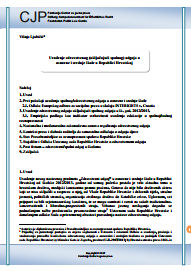
The author analyzes the introduction of health education, including sex education, into the system of compulsory primary and secondary education in the Republic of Croatia, from the first initiative of the late 90s to the present time. The author writes about public controversy between traditionally conservative and liberally progressive social forces regarding the right of parents, who hold certain world views to make independent decisions about the education of children, and, on the other hand, the constitutional obligation of the State to ensure children's right to a full and harmonious development of their personalities. The issue is addressed from the perspective of the case law of the European Court of Human Rights, which has already dealt with this issue, and the decision of the Constitutional Court of the Republic of Croatia, which emphasizes the importance of democratic, pluralistic approach in the creation of educational contents, especially when it comes to sexual education of children. How to put an end to the controversy, whose intent is to dispute the school's program of sex education on the basis of religious and/or political beliefs, still is an open question.
More...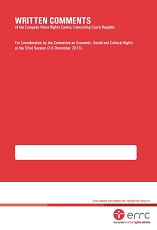
The European Roma Rights Centre (ERRC) and Praxis respectfully submit their written comments concerning Serbia for consideration by the Committee on the Rights of the Child (CRC) at its Concluding Observations of the 74th Session, which will be held from 16 January to 3 February 2017. The ERRC and Praxis have undertaken regular monitoring of the human rights situation of Roma in Serbia and this report reflects the current priorities in our work in Serbia. According to current official estimates, Roma in Serbia make up approximately 2.05% of the total population or 147,604 Roma. This makes Roma the second largest minority after Hungarians. However, a verified and accurate count remains elusive. Unofficial sources suggest that the number of Roma in Serbia is significantly higher, ranging between 250,000 to 500,000. In addition to the autochthonous groups, approximately 4,000 –50,000 Roma fled during and after the conflict in Kosovo to Serbia; only half of whom registered as internally displaced persons (IDPs). However, it is not known if all of them remained in Serbia or left for destinationsin Western Europe. Furthermore, thousands of Roma have been returned to Serbia from Western Europeancountries in the last years as failed asylum seekers; including Roma who were originally from Kosovo.Roma are the youngest ethnic group in Serbia. The average age is 27.5 years, compared to 40.2 years among the general Serbian population. According to UNICEF, the primary school completion rate for non-Roma children is 94.5% and the transition rate to secondary school is 96.5%, while for Roma children the primary school completion rate considerably lower - 63%, while the numbers for secondary school for Roma youngsters is even lower - 55.5%. Illiteracy rates range between age groups from 13.7% amongst adolescents to 57.2% among the elderly. Romani women are extremely disadvantaged when it comes to education achievements; illiteracy is estimated to reach up to 80%.
More...